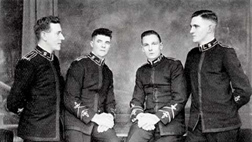
Bill Wade (left), Peter Wade’s father. member of male quartet, 1936
Children and teenagers sang in the “Singing Company” or played in the “Junior Band.” Many had private lessons, like I did for piano. I never did have enough puff for brass instruments, so I got posted to the percussion section, and later played piano accompaniment for soloists and all sorts of groups. In my youth I was told I was a lyric tenor and I did have a good voice, but it just had a rough passage on the way out! (I did sing in a male quartet during ministerial training at Bible college.) I never made it to the senior “Songsters” (choir) but I did play in the senior band.
All the above is to direct your thoughts to Ephesians 5:19 and its parallel verse in Colossians 3:16. The exhortation in Ephesians is this: “Addressing one another in psalms and hymns and spiritual songs, singing and making melody to the Lord with your heart” (ESV). KJV says “speaking to yourselves,” but most translations correctly use “to one another.” So the first part of the verse is talking about the lyrics. Pliny, the early historian, says the Christians met before daylight and recited a hymn among themselves in turn.
Lyrics can be powerful because the constant repetition of well-loved songs bring comfort and encouragement in the tight spots of life. As a preacher I’m well aware that people didn’t remember the preaching but they did remember the songs! Just a week or so ago I wrote out the first verse and chorus of an old Christian song to encourage a friend, and I did it from memory. It was a song I had sang countless times in my childhood and youth.
I actually taught at a fellowship last year where there was absolutely no singing! What a missed opportunity to get truth drilled into the mind of the believers. On our last teaching journey to the US we had one fellowship in a church building kindly loaned by a denomination that did not believe in using musical instruments in a church, but we sang a capella anyway! The opposite to this we often see on Christian television where the service is more like a rock concert, but I have written about that before.
In Ephesians 5:19 we have “psalms” (see Psalm 47:7), which were generally accompanied by a stringed instrument, “hymns,” which were songs of direct praise to God (Acts 16:25 is a good example), and “spiritual songs,” written by believers and probably the ancient forerunner of what we call “gospel songs” today. These would include songs of witness and testimony, exhortation, teaching, and biblical narrative.
So the lyrics do double duty as devotional poetry, and when set to music become very powerful. This is because if the melody is pleasant and memorable, the lyrics get a free ride and we find ourselves singing snippets throughout the day.
The two parts come together in the second half of the verse: “singing and making melody to the Lord with
The emphasis here is not on external performance but “in your heart.” Today’s worship leaders and musicians would do well to ponder that statement. All the types of music mentioned in the verse were to be sung or played with the “heart engaged, and not so as to be mere music” (Barnes). “Heart-felt” singing strikes a chord of response from the listeners, and the truth is drilled even deeper in our minds.
After the Red Sea crossing, “Moses and the people of Israel sang this song to the Lord, saying, ‘I will sing to the Lord, for he has triumphed gloriously; the horse and his rider he has thrown into the sea'” (Exodus 15:1 ESV). So let’s sing for the glory of God!



I just read your article online about eating God’s Word and it was such a comfort to me because I attend a Catholic church where it is taught that you must consume or eat Christ’s flesh and drink His blood. I have, on my own, searched scripture to try to understand why this is necessary. In reading my bible, God’s living word, I discovered that Christ did indeed say in John 6 that we are to eat His flesh but upon reading further He also states that He was talking in spirit and truth. The same words He had spoken to Nicodemus in John chapter 3 about being born again. I am not a brilliant person, just a mother of three beautiful children that God has blessed me with but God gives even the simple, wisdom and understanding, if we seek it. Anyhow, I wanted to thank you for your wisdom and please pray for me, that I can convince my cradle catholic husband to leave this false religion. God Bless, Debbie
Yes indeed, Debra, as the verses quoted in that article show its the Word of God that we should consume. This has nothing to do with the Mass or Communion or the Lord’s Supper, whatever different groups call it. I’ve yet for find a verse where it says the wafer of bread turns into the actual flesh of Jesus, so I don’t know where they get it from. Keep filling you mind with the good food of the Word and you’ll see how important it is.